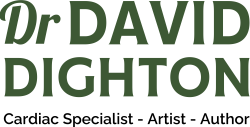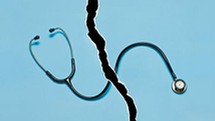





©daviddighton.com 2024


For doctors and nurses in the UK, there is no escape from medical bureaucracy. During the last years of my career, I suffered medical bureaucracy at the hands of the GMC who are hampered in their duty to protect patients and safeguard the medical profession by knowing too little about how medical practice actually functions. Because they employ lawyers, and use legalistic processes, they cannot avoid using check-
To regard NICE guidelines as immutable serves the GMC’s legalistic purpose. They can more easily judge the compliance of doctors without regard to clinical circumstances or doctor and patient meta-
What we need is a Medical Directorate (composed only of senior, appropriately experienced doctor) to assess the clinical aspects of each case. Only doctors can be expected to judge the art and science employed by other doctors when treating their patients. They could then refer cases to the GMC when they regard their actions as reckless, driven by self-
To practice medicine that will benefit patients most, all doctors must be erudite, be able to think for themselves, and have judgement good enough to decide what is best for each individual. They must, of course, have studied the relevant NICE guidelines (the consensus of medical expert advice), and have taken every aspect of their patient’s life into account (not possible in a 10 minute consultation). For an understaffed, inefficient corporation like the NHS, this is not practicable. In order to control medical practice, however, the corporation needs obedient doctors prepared to conform with bureaucratic gobbledygook, even if it is clinically inappropriate. For fear of losing their jobs, NHS doctors and nurses are easy to control. Doctors and nurses who were once educated to think for themselves are now an anachronism. To control and standardise the juggernaut that is now the corporate NHS, bureaucrats must have sheep, and cannot afford to tolerate shepherds. Admission panels at medical schools must take heed.
The science and art of medicine must be combined if patients are to be treated in ways most acceptable to them. This may not apply so much to minor medical problems, but it is essential for patients who suffer more complicated conditions; especially those who have encountered doctors who have failed to diagnose and manage them. In my book ‘The Doctor’s Apprentice’ (see here), are the lessons I learned about gaining the trust of patients and handling them to their satisfaction, with 50 years of experience.
Because I have never, and would never, follow bureaucratic dictates without an academic discussion, I came to disagree with the GMC tribunal, and questioned their fitness to judge me. As a result, I resigned from the GMC tribunal, and resigned from my work as a licensed doctor before the GMC tribunal delivered their sentence (a one-
There was a large, unaddressed elephant in the room at the time, with one question in its mind. Who might know more about safe medical practice? A doctor with 50 years of experience of high-
Because doctors are now required to function algorithmically, it is dangerous for them to think for themselves. Criticising Stalin's regime was once deadly. Criticising the NHS is not comparable, but it can finish careers. There are many medical whistle-
None of what happened to me was a tragedy, although many of my patients thought so. After all, I had worked as a doctor for 55 years, 10-
Medical politics is an ephemeral process. At the moment bureaucrats with no medical expertise rule the roost. They are not averse to threatening doctors. Whatever they do, they cannot remove the respect and trust patients have for us when we successfully serve them with experience, knowledge, expertise and good judgement.
Many of my 20,000 patients have kept their trust in my judgement. What I remain proud of is that many of my former patients will still not agree to the advice of other doctors unless they first seek my approval.
I make myself available for advisory medical comment to all those I have known well. If companies and other organisations deem my clinical expertise and experience (independent of the NHS) to be of value, I can advise them as a non-

MEDICAL COMMENTARY
Medical Commentary
I spent most of my working life as a private physician and cardiologist. From the side-
The truth is different. Fifty years ago, I simply couldn't stand the prospect of bending to the management whims of corporate NHS bureaucrats. I would never agree with their tacit purpose: 'bureaucracy first, patients second'.
This still pertains today in the NHS. I wanted to treat my patients as individuals; not as numbers, and without clinical bureaucratic influence. This caused me to start my own private clinic. This I did with my colleague Dr. David Baxter at the Loughton Clinic in 1973.
My predictions about what might happen to the NHS proved correct, and close to the predictions made by many doctors at the inception of the NHS, in 1948. Look how UK patients now suffer the consequences of bureaucrat-


My view of what defines a valued health professional, I have expressed in a poem:
The Art of Medicine
Who will hold a troubled hand,
And take guardianship,
Of enough hope and trust,
To settle a troubled mind?
Who will step forth with knowledge enough,
To make disease submit;
Halting its progress,
Against the odds?
Who will come forth with fortitude enough,
To assume the care of a life, or a death,
And through trust and confidence,
Encourage a smile to break the grip of fear, pain, and grief?
Who will come forth,
With humility enough,
To step beyond science,
And embrace the human spirit?
Among others, there will be some complete physicians.
| Who Loses Wins |
| The Doctor's Apprentice |
| The NHS. Our Sick Sacred Cow |